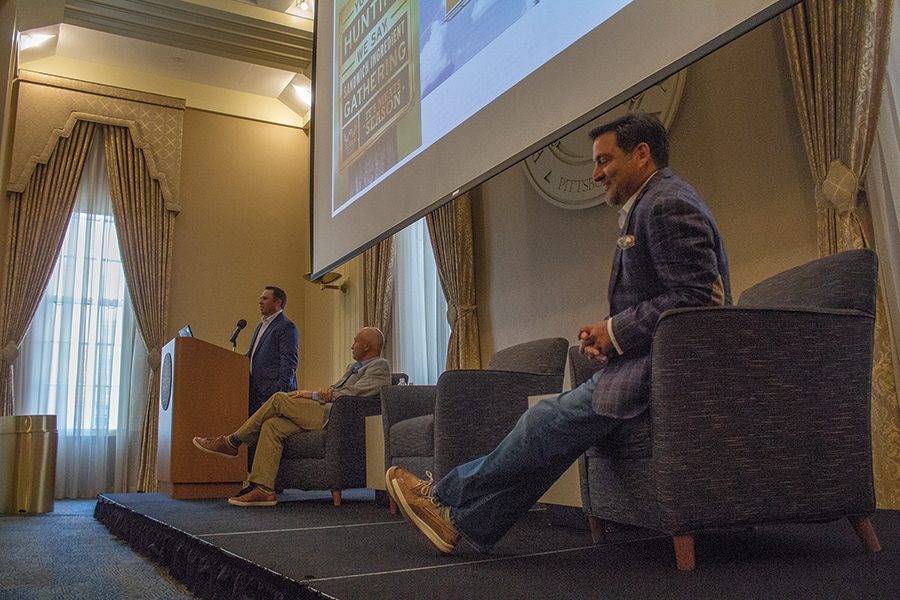A “meaty” presentation on sports sponsorships
Photo by Robert Berger
Chris Eames (Right) and Sean Hanrahan (Middle) of ESPN and Arby’s President Rob Lynch (Left), address students during the first Pittsburgh Center for Sports Media and Marketing event of the semester.
September 25, 2018
The Pittsburgh Center for Sports Media and Marketing held its first event of the fall semester Thursday, “Why a Sports Sponsorship Works.” Featuring Sean Hanrahan and Chris Eames of ESPN and Arby’s Restaurant President Rob Lynch, the trio discussed what goes into setting up a sports sponsorship and why the two companies make a successful partnership.
While working for Taco Bell, Lynch was asked to take on a job as the Brand President and Chief Marketing Officer of Arby’s, who at the time were struggling when it came to advertising efforts.
After taking on the challenge of handling the marketing office, Lynch began working with the company on an overhaul of menu items and advertising techniques. The most successful tactic being the “We Have The Meats” campaign.
“I was told we’re either going to change things or go out of business,” Lynch said.
While touching on the campaign, Lynch explained the key role social media plays in the world of advertising, along with how ESPN is a perfect fit as an advertising partner. One example discussed is the partnership between Arby’s and professional golfer Andrew “Beef” Johnston.
“Social media has changed the world…anyone can join the conversation,” Lynch said.
After watching Johnston golf, Lynch and the Arby’s brand felt he would be a perfect sponsor for the company and reached out to him immediately. In just a few days, Johnston went viral.
Johnston’s efforts were being shared online and covered by numerous outlets from ESPN, CNN and Jimmy Kimmel.
“It works because it’s real, it makes sense,” Lynch said.
Lynch concluded that sports sponsorships work well because of the wide demographic sports reach, as well as the popularity of these stories outside of the sports world.
Afterwards, Johnston returned to golf in European tournaments and the partnership ended. Even with the partnership being over, Johnston still wears his Arby’s merchandise, but doesn’t recieve compensation because of the popularity garnered from the original ad campaign.
Throughout the afternoon, the importance of knowing and understanding competition was stressed. Both Hanrahan and Eames touched on how ESPN is the most unique and well-known sports station on the air. Highlighting shows such as SportsCenter and Scott Van Pelt’s midnight airing edition of the show.
With Arby’s being a main sponsor for Van Pelt’s midnight show, the program is one of television’s most watched by men over 18, the main demographic Arby’s targets. On this topic, Lynch stressed the importance of knowing a company’s demographic.
He continued on to explain that males are a target because they tend to eat meat more at fast food restaurants. Along with this, he detailed that the company has no interest in catering towards vegetarian options like their competitors do, because it isn’t their territory.
“Understand how you’re different and better [than a competitor] and represent that,” Lynch said.
With the floor open to questions, the trio shared tips with students for when they are entering the job world after graduating from college.
“Just be curious about everything, be interested, not interesting, pay attention, ask smart questions, learn more about the business you’re going into,” Eames said.
Eames also brought up the difference between his generation of workers and millennials. He encouraged students to find value and purpose in the work they do because they tend to bounce from job to job trying to find it.
Lynch touched on the same topic, adding that millennials should not be quick to decide a career path and they should find a way to become inspired and passionate with their work.
Junior public relations and advertising major Elizabeth Waldinger was in attendance Thursday and felt this was her biggest takeaway.
“Passion is the basis of everything, and you can tell the companies that put passion into their advertising and work,” Waldinger said. “It makes a big difference.”
On the topic, Hanrahan highlighted three important pieces of advice.
“One, be a good team player,” Hanrahan said. “Two, learn about working hard, late or what to do when things go wrong. Three, listen and ask questions.”
The Pittsburgh Center for Sports Media and Marketing was founded in 2011 and has worked to bring industry professionals to campus every semester since. In the past, the organization has welcomed guests such as NBC’s Doc Emrick, ESPN’s Merril Hoge and WPXI’s Bob Pompeani.
Emma Christley contributed additional reporting.
Disclaimer: Robert Berger also serves as an advisory board member for the Center but does have any executive power within the organization.



















